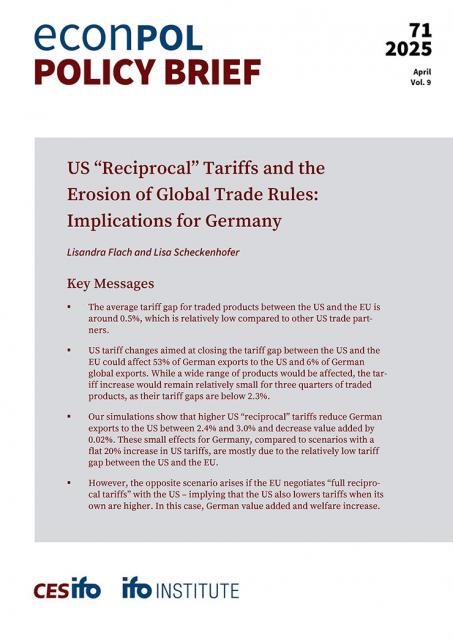News Archive

Euro Area Reform Preferences of Central and Eastern European Economic Experts
|
EconPol Working Paper
| News
A variety of reforms have been implemented to improve the institutional set-up of the euro area over the last decade, yet the political and academic reform debate remains intense and the future of the euro area is unclear. One striking feature of the ongoing debate is that it is characterized prominently by contributions from larger euro countries from Western Europe. This study, by Sebastian Blesse (EconPol Europe, ZEW Mannheim), Annika Havlik (EconPol Europe, ZEW Mannheim and University of Mannheim) and Friedrich Heinemann (EconPol Europe, ZEW Mannheim and Un

Assessing the Cost of Uncertainty Created by Brexit
|
EconPol Opinion
| News
The uncertainty surrounding Brexit is costing the UK economy £16 billion per year, according to calculations from EconPol researcher Fabien Tripier (Professor of Economics at the Université Paris-Saclay and scientific advisor at the CEPII). The cost is based on the level of political uncertainty, the effect of that uncertainty on the economy, and the comparative trajectory in the absence of uncertainty.

Ring-fencing Digital Corporations: Investor Reaction to the European Commission’s Digital Tax Proposals
|
Working Paper
| News
In this working paper, Daniel Klein (University of Mannheim), Christopher A Ludwig (EconPol Europe, ZEW Mannheim, University of Mannheim) and Christoph Spengel (EconPol Europe, University of Mannheim, ZEW Mannheim) study the effect of digital tax measures on firm value and find that expectations about ring-fencing digital tax measures impact firm values. An analysis of investor reaction to the European Commission’s proposals on the taxation of digital corporations reveals a significant abnormal capital market reaction of -0.692 percentage points.

The Political Economy of Multilateral Lending to European Regions
|
Working Paper
| News
European regions which have representatives on the board of directors at the European Investment Bank (EIB), the world’s largest multilateral lending and borrowing institution, are more likely to receive loans than those regions in Europe which aren’t represented. Researchers Zareh Asatryan (EconPol Europe, ZEW Mannheim) and Annika Havlik (EconPol Europe, ZEW Mannheim, University of Mannheim) collected information on the regions of origin of around 500 national representatives at the EIB’s Board of Directors (the decisive body for loan approvals) since its foundation in 1959.

The Social Costs of Side Trading
|
Working Paper
| News
This working paper examines resource allocation under private information when the planner cannot prevent bilateral side trading between consumers and fi rms. Adverse selection and side trading severely restrict feasible trades: each marginal quantity must be fairly priced given the consumer types who purchase it. Authors Andrea Attar, Thomas Mariotti and François Salanié (EconPol Europe and Toulouse School of Economics) discuss the relevance of the results for insurance and fi nancial markets.
